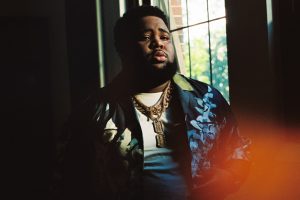Of all the muscles that Joohoney strengthened during his mandatory enlistment in the South Korean military, his mind was the most important. To carry out day-to-day tasks, the 30-year-old rapper found he needed to build up a solid mental core — and that stability has neatly carried over into his equally demanding civilian life as one-sixth of K-pop powerhouse group Monsta X. Explore See latest videos, charts and news “I’ve always loved the phrase ‘just do it,’” he explains to Billboard, sitting next to bandmates Shownu, Minhyuk, Kihyun and Hyungwon in a cozy L.A. studio (the final member, I.M, is recuperating from an injury back in Seoul at the time of the interview). “It was in the military that I took that further and started thinking, ‘No brain, no pain,’” he continues. “Right now, that’s pretty much been my approach. No matter what kind of challenge I’m faced with, not to get caught up in the moment and keep moving forward.” Still, there was a lot to consider while making their latest EP, The X, which is at once a celebration of 10 years together and a long-awaited return to form. Now having all completed their compulsory, 18-month military service apart from I.M, the six members of Monsta X were more than eager to pick up where they left off. “It’s been four years since, as a group, we’ve released a new album,” says honey-voiced Kihyun. That’s nearly an eternity in a landscape that moves as fast as K-pop. The gap weighed heavily on the recording process. “That was my mindset,” he adds. “We had to show what we got.” The result is a display of remarkable stamina. Sophisticated B-sides (“Savior,” “Tuscan Leather,” “Catch Me Now”) speed light years ahead of peers, unrivaled in their sensuality. But ground-shaking, Dem Jointz-produced banger “N the Front” sends the boldest message — Monsta X remains at the top of their game, it seems to say, leading the charge not only for their generation of K-pop, but also setting the standard for an entire industry that they just took extended time away from. That spirit is borne out by the chest-puffing lead single “Do What I Want,” which I.M mentions over email that he hoped would “shock” fans. “Yup, it’s been a while since I crushed this race, ya/ You already know I have the pace of a stallion,” his writing partner Joohoney brags in its lyrics. This isn’t empty bravado, either. In the intervening year-and-a-half off, he made 40 songs, mostly while on vacation. “I wouldn’t say I felt like I needed to catch up on lost time once I got back,” the rapper shrugs. “I knew that I’d get back into a rhythm.” Today is yet another test of the group’s endurance. While never-ending rounds of press spread into the evening, Monsta X sets a tempo and refuses to waver, cracking jokes and hyping each other up while taking stabs at English. As always, no time or effort is being spared in the lead-up to KCON LA — a homecoming to the stage Monsta X first played just months after debut — and the subsequent album release. Recently, though, there’s a new wrinkle in the members’ schedules: shooting TikToks, which they manage to squeeze into a short break between two sit-down interviews. “These days, the trend is short form,” explains Minhyuk. It’s not exactly a development to his liking, he says, tossing his hands up in faux indignation. “But I can’t change the world.” Regardless of whether he’s putting on extra ire for comedic effect, there’s truth to what Minhyuk is saying. “It feels like we’ve moved away from a culture of appreciating the whole music video, the whole song,” he adds. “Because now it’s become more like, ‘Is there a moment that is going to go viral?’” The critique almost makes you forget that the singer is only in his early thirties. Yet, while the six members aren’t quite elder statesmen of K-pop, they’ve witnessed some of these seismic changes take root over the past decade. What really stands out, though? The ways the industry has remained just the same: Monsta X was originally formed in 2015 by a brutal Mnet reality show, which put talented young hopefuls through the wringer for a potential spot in the lineup. These programs still abound to this day, despite the mental and physical toll they take on contestants. Returning to a similar show as a mentor earlier this summer, Kihyun felt like he had just stepped back in time. “All of this must be really tough,” he recalls thinking during the taping. “I’ve been in their shoes, so I felt like I knew exactly what [the trainees] were feeling.” It stirred a mixture of sympathy and awe inside him: their earnestness took him back to the start of their journey, not knowing if “making the cut” would even translate to success in the real world. As he considered the “challenges they will have to face,” he realized those were once ahead of him, as well. Monsta X debuted as a group of adults aged 19 to 22, which is hardly common practice, since K-pop labels seek to maximize viable years for their boy groups. Kids are frequently scouted as early as elementary school, “while they are still very much growing up and figuring themselves out,” Minhyuk points out, scratching the back of his neck. “It usually means that idols are learning to manage and reciprocate the love and attention they are getting from their fans before they ever really learn to take care of their own mental health.” He continues, “Just being honest with you here, I personally think it’s one of the bigger flaws of the K-pop industry.” He offers a piece of wisdom to his fellow idols. “My wish would be for those in K-pop, those who are making music, those who are performing for audience… Learn to put yourself first,” the singer says. He doesn’t have all the answers, but











